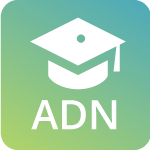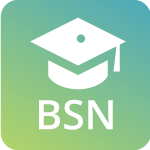Registered Nurse Career and Degree Guide
- Registered Nurse Overview
- Duties
- Salary
- Education
- LPN-to-RN Programs
- Paramedic-to-RN Programs
- Continuing Education for Nurses
Related Reading
What Education Is Needed To Become a Registered Nurse (RN)?

Registered nurses (RNs) are required to have a minimum of an Associate Degree in Nursing (ADN), but a Bachelor of Science in Nursing (BSN) may help you secure a job with more responsibility and higher pay.
In this Article
While the RN designation is often referred to as a “degree,” that is actually incorrect. To become an RN, one must earn an associate’s degree or a bachelor’s degree with an emphasis in nursing. Once you have one of those degrees, you are eligible to sit for the NCLEX-RN exam to be licensed as an RN.
How Long is Nursing School?
The length of a nursing education depends on which degree you pursue. Programs for licensed practical nurses (LPNs), for example, can last about 12-18 months. BSNs typically take four years to complete. ADNs fall in the middle, taking around two years to finish.
These programs have distinct curriculums that prepare students for different nursing roles. ADN and BSN degrees both prepare you for an RN position, which supervises positions like LPNs.
Which Nursing Degree Should You Earn?
To become a licensed nurse, individuals must complete an approved nursing program and successfully pass the National Council Licensure Examination (NCLEX-RN). Additional licensing requirements, including criminal background checks, may vary by state. It is essential to consult the respective state’s board of nursing for specific education and licensing requirements.
The right nursing degree for you depends on what type of job you want, how long you are willing to go to school and how much nursing education you already have.
Option 1: Earn your associate degree in nursing (ADN)
Earning an ADN is a popular option — it’s the fastest path to becoming a registered nurse without any prior nursing education. An ADN opens the door to entry-level nurse positions which provide you with hands-on experience in the medical field.
Option 2: Earn your bachelor’s of science in nursing (BSN)
If you want a more comprehensive education that could open more doors in your nursing career, earning a BSN is another great option. These programs take longer to complete but give you a nursing education with greater breadth and depth than an ADN. Because of this, nurses with a BSN tend to be qualified for nursing positions beyond the entry level, which may also yield a higher salary.
Option 3: Become an RN through an accelerated nursing program
There are several different programs that give you a nursing education in less time than a traditional ADN or BSN. These programs are designed for people who either have some level of nursing education already or who have an education in another field.
LPN-to-RN
LPN-to-RN bridge programs are intended for existing LPNs who wish to advance their career to become an RN. LPNs assist RNs and doctors with a variety of patient care duties—they already completed an LPN educational program, which teaches them introductory nursing skills and topics and typically lasts about 12 months. LPN-to-RN bridge programs build upon this foundational knowledge and lead to either an ADN or BSN degree, depending on which type of program you enroll in.
Since both take into account the knowledge learned in an LPN program, they take less time to complete than a standalone ADN or BSN. LPN-to-ADN programs typically take one to two years, and LPN-to-BSN programs typically take two to four years.
Paramedic-to-RN
Paramedics are not nurses, but they do have experience treating people in emergencies and providing basic patient care. Paramedic-to-RN bridge programs prepare paramedics for a career in nursing while taking into account their existing medical knowledge. Like LPN-to-RN bridge programs, you can do either a Paramedic-to-ADN or Paramedic-to-BSN program. ADN bridge programs typically last 12-18 months, while BSN bridge programs last about two to three years.
Accelerated Bachelor of Science in Nursing (ABSN)
ABSN degrees are intended for people who already have a bachelor’s degree in another field but want to make the switch to nursing. They have a rigorous, fast-paced curriculum that allows you to finish with a BSN in a fraction of the time, typically 1-2 years. Part of the reason for this is that you’ve probably completed most general education requirements already through your other degree.
Is a BSN Degree Better Than an ADN Degree?
It depends. If you are looking for an entry-level nursing job at a hospital or nursing home, for example, an ADN can help you get your foot in the door. An associate degree also takes about half the amount of time to earn as a bachelor’s degree, so if you want to get working sooner, an ADN might be a good choice.
RNs with a BSN, on the other hand, may make more money and often hold positions with more responsibility.
How This Nursing Student Conquered Her Fears About Going Back to School
What Testing and Licensing Will You Need?

After completing your degree program, you’ll need to take the National Council Licensure Examination, or NCLEX, to qualify to become a licensed RN, which is administered by the National Council of State Boards of Nursing (NCSBN).
The test is used to determine whether you’re prepared for entry-level nursing and includes a minimum of 75 questions. You may answer up to 265 questions if you haven’t reached a passing score after the first round.
In order to sit for the exam, you’ll need to apply for a nursing license from your state board of nursing. Since each state has different eligibility criteria, check with your state’s agency to ensure you’ve met the requirements in order to take the exam.
The NCLEX exam covers four “categories of needs,” according to the National Council of State Boards of Nursing:
You can find sample tests online or in books, and you can take an NCLEX prep course through various schools and companies.
What Will You Learn in Your Courses?

Associate degree classes will include core education requirements such as:
Anatomy, microbiology, chemistry, nutrition, and psychology, along with specific nursing topics.

Bachelor’s in nursing program coursework typically provides more depth and detail in various subjects, such as:
Emergency care, nursing research, and population-based practice.
Are Online Programs Available?
Nursing is a hands-on profession, but both ADN and BSN degree programs can be completed at least partly online. Clinical hours are the exception. Clinicals are hands-on requirements that place a nursing student directly in a healthcare setting, and these must be fulfilled in person at a clinic, hospital, or other brick-and-mortar facility.
If you’re a nursing student in a rural area with no classroom programs within reach, an online program can give you access to a wide range of educational opportunities across the country. And if you’re already busy, online learning can give you room to meet responsibilities that prevent you from attending school in person.
Are There Prerequisites?
An ADN or nursing diploma is required to practice as a registered nurse, but entry to an RN degree program is based on a few things.
About Entrance Exams
Nursing schools want to ensure you’re competent in a variety of subjects before enrolling you in a program, so you’ll likely be asked to take an entrance exam. There are a few different entrance exams schools use, but two popular ones are:
Assessment Technologies Institute’s Test of Essential Academic Skills (TEAS)
The Test of Essential Academic Skills is one of the most common tests required of aspiring nurses. The test evaluates and measures proficiency in math, English, science, and reading. You’ll be tested on scientific reasoning, algebraic formulas, grammar, and life sciences.
National League for Nursing’s Pre-Admission Examination (PAX)
Administered by the National League for Nursing, the Pre-Admission, or “PAX,” exam covers reading comprehension, general biology, geometry, algebra, earth science, first aid, and health in a multiple-choice format.
What Accreditation is Available for Your Program?
Accreditation is a sure-fire way to know if a program meets nationally recognized nursing education standards. Independent accrediting organizations register schools once they’ve undergone an arduous application process. For students, attending an accredited school is a must if you’re hoping to receive financial aid. Secondly, earning a degree at one accredited school allows a student to pursue further education at other accredited schools.
What Are the Continuing Education Requirements?
What Testing and Licensing Will I Need?
Once you’re working as a registered nurse, you’ll be required to take additional educational courses throughout your career to keep your license current. While not all states mandate this, your employer may require it in order to maintain a specialty certification.
What Can You Expect to Earn as an RN?
Your pay as an RN depends on a number of things: where you live, what specialty you choose, and your experience, to name a new. Demand for RNs can also affect your salary: healthcare facilities in rural or remote regions may offer bonuses to nurses willing to relocate. Nationwide, RNs are in demand. According to the U.S. Bureau of Labor Statistics (BLS), the profession is expected to grow by 5.6% through 2031; about as fast as average for all occupations.
FAQ: Earning your RN degree
Your education doesn’t have to stop once you get your RN license. Besides any continuing education requirements you may have, you can also earn an higher level nursing degree. A master’s of science in nursing (MSN) is designed for nurses with a BSN education who want to expand their skills and possibly specialize.
A Doctorate in Nursing Practice (DNP) prepares students for either a specialized clinical position, or to move onto a leadership and policy role. Both of these types of degrees can lead to becoming an Advanced Registered Nurse Practitioner (ARNP).
Nursing is a hands-on profession, but both ADN and BSN degree programs can be completed at least partly online. Clinical hours are the exception. These hands-on requirements place a nursing student directly in a healthcare setting, and must be fulfilled in person at a clinic, hospital or other brick-and-mortar facility.
If you’re a nursing student in a rural area with no classroom programs within reach, an online program can give you access to a wide range of educational opportunities across the country. And if you’re already busy, online learning can give you room to meet responsibilities that prevent you from attending school in person.
Yes, most schools accept either a high school diploma or GED with your initial application to get in to their school. Most programs don’t look at your high school or GED education once you’ve been admitted to the school, but instead want to see that you’ve passed the necessary prerequisite courses required for the actual degree program.
Typically there is no limit for how long after graduating that you take the NCLEX. However, you should check with the NRB where you live to find out if there are any restrictions regarding when you can take the NCLEX. After successfully registering for the NCLEX and receiving your Authorization to Test (ATT), you have a certain window of time to take the test. The average ATT length is 90 days.
You might be able to get by without taking physics, but not chemistry.
Chemistry is essential to understanding critical processes in the human body. For example, nurses need to understand how our body functions on a cellular level, or how different medications interact with one another, which are part of the field of chemistry. Most nursing programs require some chemistry prerequisite courses and possibly more chemistry courses during the degree.
If you have a degree in another field, you can switch to nursing with an ABSN degree. These are intended for people who have an undergraduate degree in another subject area. These degrees take into account the general education courses you probably took in your prior degree, and are able to focus solely on the nursing courses you will need to become an RN at an accelerated pace.
Understanding the human mind through a psychology degree can be very beneficial to a nursing career. If you want to combine your psychology knowledge with nursing, you might consider pursuing a psychiatric or mental health nurse specialty.
